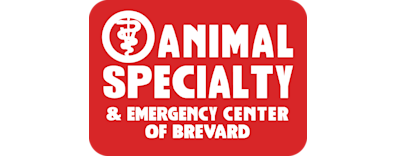Animal Specialty & Emergency Center of Brevard
Tracheal Collapse
Most cases of partial tracheal collapse are not true emergencies but should be treated as soon a possible when recognized for better prognosis and quality of life.

If your pet reaches the point where distress seems extreme, your pets gums appear pale or blue or if collapse results, treat this as an emergency and rush your pet to the veterinarian.
Tracheal collapse is a disease primarily affecting toy breed dogs that results from degeneration of the tracheal cartilage rings.The canine trachea is composed of a series of C-shaped cartilage rings which are connected by muscle and fibrous tissue to form a tube that carries air between the mouth and the lungs. The cartilage rings of affected individuals become progressively weaker and flatten over time.
As the trachea flattens, resistance to air flow increases. Patients affected by tracheal collapse typically exhibit a “goose honking”cough, especially when excited or stressed. Some patients may produce more of a wheezing or snoring noise rather than a classic cough. Depending on the location of the collapse within the trachea, patients can have difficulty breathing in, breathing out, or both. A breed predisposition for tracheal collapse exists in Yorkshire Terriers, Pomeranians, Toy Poodles, and Chihuahuas, although other breeds also can be affected.
Clinical signs are generally recognized for several years prior to diagnosis, which occurs around 6 years of age on average. There are several factors which can contribute to the onset of coughing from tracheal collapse. Pre-existing heart disease, lung disease, allergic airway disease, obesity, and exposure to cigarette smoke have all been shown to contribute to the onset of tracheal collapse.
Tracheal collapse can be diagnosed in a variety of ways. Radiographs (x-rays), fluoroscopy (real-time x-rays), and tracheoscopy (camera in the trachea) can all be used to diagnose tracheal collapse. Often a combination of these tests is necessary to achieve a complete diagnosis. Bacterial infections of the trachea and lower airways are common in patients with tracheal collapse. A culture sample (to examine for bacterial growth) can usually be collected when other diagnostics are performed.
Depending on the location and severity of collapse and the severity of symptoms, either medical or surgical management may be recommended. Medical management commonly involves the use of a combination of cough suppressants, steroids, sedatives, and other medications. Around 70% of patients with tracheal collapse can be managed with medications alone. Some patients will not improve sufficiently with medical management, either due to the severity of tracheal collapse or their lack of response to traditional medical therapy.These patients will need additional intervention to improve their ability to breathe. A wide variety of procedures have been described for surgical treatment of tracheal collapse; however, most veterinary surgeons perform one of two different procedures. Surgical management of tracheal collapse aims to return the trachea to its normal size and shape and help maintain the trachea in that position. C-shaped rings can be made from polypropylene (a type of plastic) and are sutured onto the outside of the trachea to provide external support. The trachea can also be supported from the inside by a flexible, self-expanding, metallic stent made of a material called nitinol. Both procedures have advantages and disadvantages, but when properly applied good results can usually be obtained in 75-80% of cases. Patients undergoing surgical management of tracheal collapse usually need medications at least in the short-term; however, many patients will not need medications long-term following surgical treatment.
Additional measures may need to be taken to treat other underlying diseases and to limit exposure to any predisposing environmental factors. With proper management, most dogs with tracheal collapse can have a very good quality of life with a normal expected lifespan.
Our veterinary team can determine the best treatment for your pet’s specific tracheal collapse condition. Call us today at 321-725-5365 to find out how we can help.
